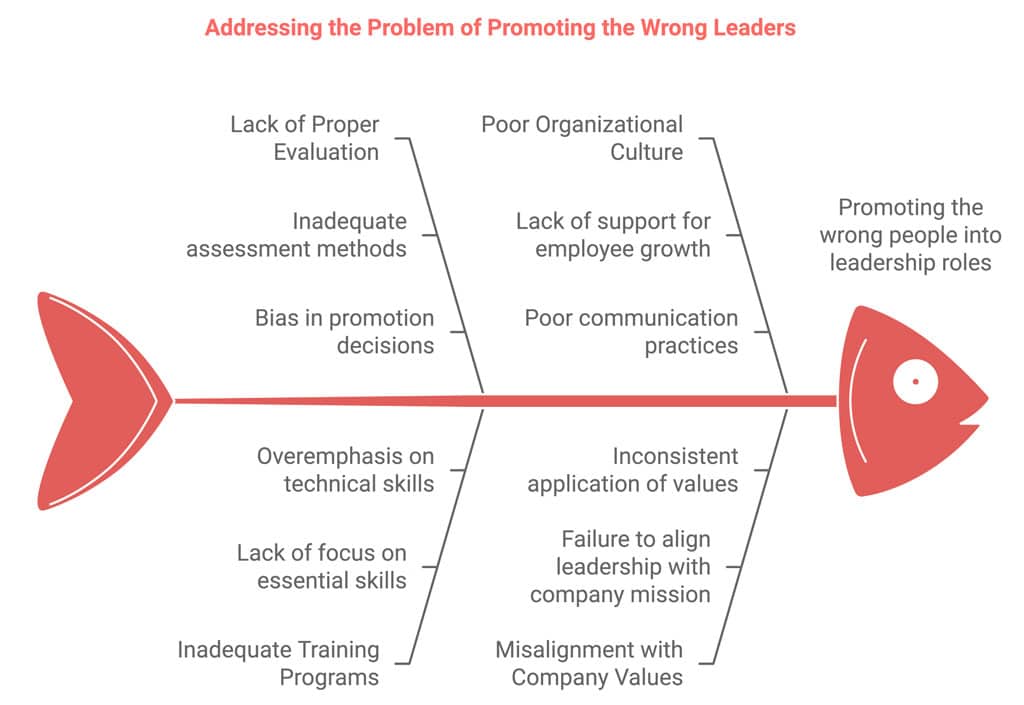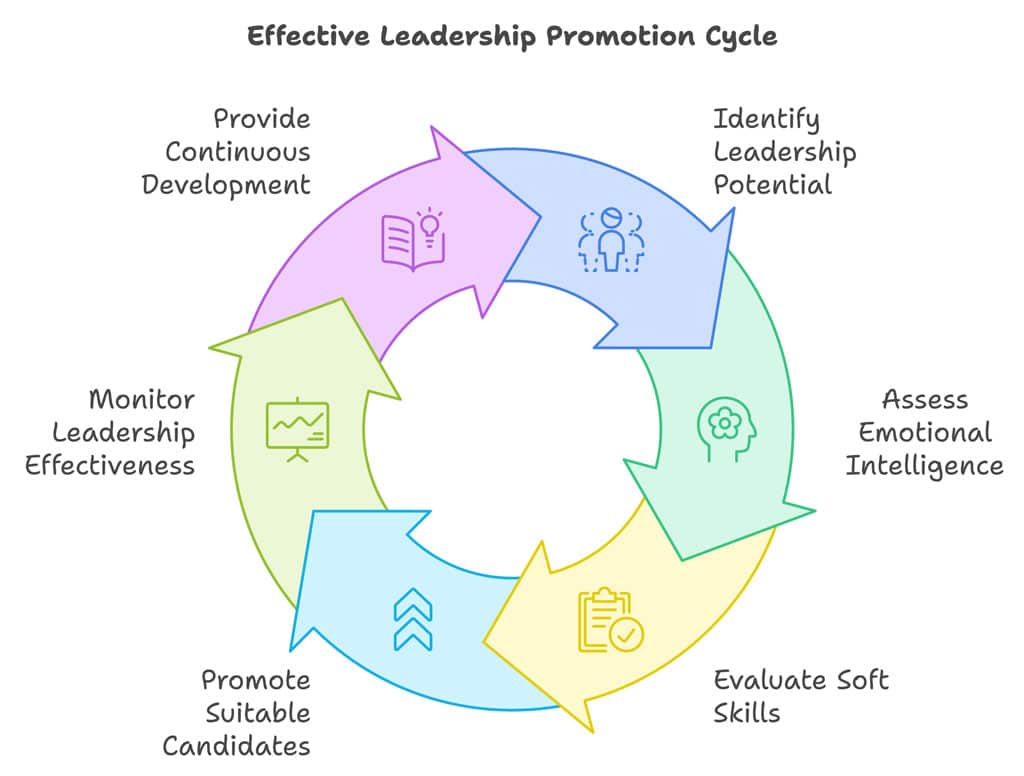5 Reasons Why Companies Promote the Wrong People into Leadership Positions—and How to Fix It

Leadership is one of the most critical components of a company’s success. Great leaders inspire teams, drive innovation, and create cultures where people thrive. Yet, despite the importance of leadership, many companies continue to promote the wrong people into leadership roles, leading to disengagement, high turnover, and poor performance. This issue is not just a minor mistake—it’s a systemic problem that businesses are struggling to address. In fact, Gallup research shows that 82% of the time, companies promote the wrong people into management roles. This leads to a host of issues, including low employee engagement, poor decision-making, and declining productivity.
The growing trend of leadership training programs focused on authenticity and human-centric leadership is often an attempt to fix the damage caused by poor leadership decisions. But instead of investing heavily in fixing the problem, wouldn’t it make more sense to avoid the issue altogether by promoting the right people from the start?

Here are five reasons why companies often promote the wrong individuals into leadership positions, and what we can do to get it right.
- Performance Over Potential
One of the most common mistakes companies make is assuming that top performers in individual roles will naturally excel in leadership. According to research from the Harvard Business Review, being a great individual contributor requires a different skill set than leading others. High performance does not automatically translate into leadership capability. Leadership is about influence, emotional intelligence, and the ability to guide others to success—not just about getting your own tasks done exceptionally well.Solution: Companies need to focus on identifying leadership potential rather than just rewarding high performance. Look for candidates who demonstrate the ability to mentor, inspire, and empower others. Implement leadership development programs that focus on nurturing soft skills, not just job-specific competencies.
- Failing to Recognize Emotional Intelligence
A true leader must possess emotional intelligence (EQ)—the ability to understand and manage their own emotions while recognizing and influencing the emotions of others. However, many organizations overlook EQ in favor of technical skills or job experience when making promotions. According to TalentSmart, 90% of top performers possess high emotional intelligence, yet this is often not considered a priority during the promotion process.
Solution: Make emotional intelligence a core component of the promotion process. Evaluate candidates not only on their technical abilities but also on their communication skills, empathy, and ability to navigate interpersonal dynamics. Integrating EQ assessments or 360-degree feedback from peers and subordinates can help identify candidates with the emotional intelligence needed to lead effectively.
- Bias Towards Tenure
Many organizations still operate on the principle that seniority equals suitability for leadership. While experience is valuable, tenure alone doesn’t guarantee someone will make a great leader. In fact, promoting based on tenure alone often leads to stagnation, as those individuals may be resistant to new ideas and approaches. The Corporate Executive Board found that only 25% of employees feel that their companies have effective processes for identifying and promoting leadership talent, suggesting that tenure-based promotions often miss the mark.Solution: Shift the focus from seniority to skills and potential. Encourage leaders to assess a wider range of candidates for leadership roles, including those with fresh ideas and diverse perspectives. The goal should be to create a leadership pipeline based on merit and capability, not just years of service.
- Overlooking Soft Skills
Companies often emphasize hard skills like technical expertise or industry knowledge when promoting individuals into leadership roles. While these skills are important, they are not sufficient for effective leadership. Soft skills, such as communication, collaboration, and conflict resolution, are essential for guiding teams and driving long-term success. A LinkedIn Learning report identified soft skills as the number one priority for talent development, yet many organizations still don’t prioritize these attributes when selecting leaders.Solution: Incorporate soft skills assessments into the promotion process. Look for candidates who excel in team collaboration, communication, and conflict management. You can also implement leadership simulations or role-play scenarios during the interview process to evaluate how candidates handle real-world leadership challenges.
- Promoting Based on Availability, Not Readiness
Sometimes, companies make the mistake of promoting someone simply because they are available or willing, rather than because they are truly ready. This can happen when organizations are in a hurry to fill leadership roles or don’t have a clear succession plan. Promoting someone who isn’t ready can have a lasting negative impact on the team’s morale, performance, and overall company culture.Solution: Develop a clear leadership pipeline and succession planning strategy to avoid rushed decisions. Identify high-potential employees early, and provide them with the leadership training and mentorship needed to prepare them for future roles. This ensures that when leadership positions open up, the right candidates are ready to step in.
Training as a Reaction to Poor Promotion Decisions
The explosion of training programs focused on authentic leadership and human-centric management is often a reaction to the promotion of the wrong people into leadership roles. These programs aim to teach individuals how to be more empathetic, authentic, and human in their leadership—skills that the right leaders should inherently possess. It’s an attempt to reverse the effects of promoting those who may lack the necessary interpersonal skills or emotional intelligence.
But wouldn’t it be easier to avoid the problem in the first place by promoting individuals who already demonstrate these traits? By promoting leaders who naturally exhibit authenticity, emotional intelligence, and the ability to inspire others, companies can avoid the need for extensive remedial training.
Promoting the Right People from the Start

Promoting the right people into leadership positions is not only about finding those who can get the job done, but those who can do it while leading others with empathy, vision, and trust. Companies need to move away from the outdated model of promoting solely based on performance, tenure, or technical expertise. Instead, they must focus on leadership potential, emotional intelligence, and a broader set of soft skills that drive success in the long run.
By implementing thoughtful and proactive strategies, companies can ensure that their leaders are not just good at what they do, but capable of elevating their teams and driving sustained success. It’s time to focus on promoting the right people—and build a future where leadership training is not a correction, but a continuous evolution of already great leaders.
Written by Gordon Tredgold.
Have you read?
Best Fashion Schools. Best Universities. Best Medical Schools. Best International High Schools. Countries: Most Female Billionaires.
Bring the best of the CEOWORLD magazine's global journalism to audiences in the United States and around the world. - Add CEOWORLD magazine to your Google News feed.
Follow CEOWORLD magazine headlines on: Google News, LinkedIn, Twitter, and Facebook.
Copyright 2025 The CEOWORLD magazine. All rights reserved. This material (and any extract from it) must not be copied, redistributed or placed on any website, without CEOWORLD magazine' prior written consent. For media queries, please contact: info@ceoworld.biz








